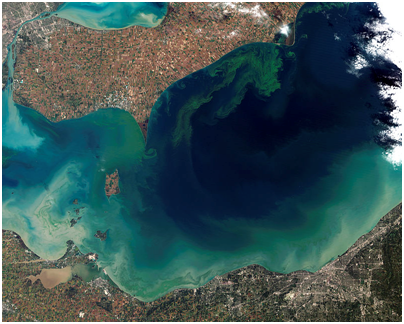I have blogged a lot about the problems associated with nuclear power. One concern that I have not said much about is thermal pollution of waterways. A nuclear reactor requires a huge amount of water to cool the reaction process. This water is drawn from a lake, a river or an ocean. Once the water has served its purpose, it is returned to the body of water it was drawn from. This water can carry up to seventy percent of the heat generated by the nuclear fission processes in the plant. This can have an adverse effect on the ecosystem of the waterway.
The ambient temperature of a body of water is critical to the health and well-being of the organisms that live in the water. Normally, bodies of water can absorb heat from natural sources without much influence on the average temperature. Because of this natural stability, most aquatic organisms evolved with biochemical systems that are suited for a narrow range of temperatures. Organisms can often adapt to small and/or gradual changes in temperature. However, if a large amount of heat is suddenly added to a body of water, the temperature can move out of the acceptable range for many of the organisms and they may die.
One of the most critical variables for aquatic life is the dissolved oxygen in the water. As the temperature of a body of water increases, the dissolved oxygen content drops. A ten degree Celsius rise in the average temperature of a body of water can eliminate some species entirely. Assimilation of organic wastes by aquatic microorganisms in very sensitive to temperature and a big change can interfere with this assimilation.
Thermal pollution can kill aquatic plants as well as fish and microorganisms. This can have a devastating impact on the entire web of living organisms that make up and depend on the food chain in the body of water. There is also the danger of the arrival of invasive foreign species that can tolerate the higher temperatures and replace the depleted native species.
Small changes in water temperature within the acceptable range drive a variety of stages in the life cycles of aquatic life. Migration and spawning are two of these important stages. If the temperature suddenly changes radically because of a the addition of a new source of heat, the interference in the life cycles of aquatic organisms can be devastating. Some species will migrate to a more accommodating environment and impact the ecosystem in their new home.
Larvae and eggs of fish in rivers and lakes is sensitive to temperature. If there is a big change in temperature, they may not even hatch. Early development of immature aquatic organisms is also very sensitive to water temperature and the young creatures are the most affected by temperature differences. Thermal pollution can have serious impacts on the immune systems of juvenile aquatic organisms. Parasites, pathogens and toxins can have a greater impact than normal with raised temperatures.
Long term elevated temperatures in bodies of water can result in huge growth of bacteria and plants which cause algae blooms that will deplete the dissolved oxygen even further with attendant negative effects.
Thermal pollution from nuclear power plants does not get much press but it is real and having a serious impact on aquatic ecosystems. If more nuclear power plants are built, they will have an even greater negative impact on the life in bodies of water used for cooling. This does not seem to me to be a good way to fight climate change.
Aerial picture of an algae bloom:
